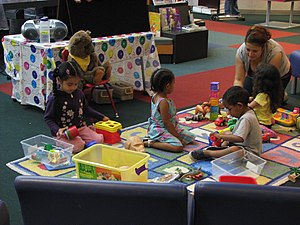


Atoy library lends or hires out toys, puzzles, and games, functioning either as a rental shop or a form of family resource program. Toy libraries offer play sessions for families and a wide range of toys appropriate for children at different stages in their development. Toy libraries provide children with new toys every week or two, saving parents money and keeping children from boredom. They are popular in the French-speaking world, where they are called "ludothèques".
Access to ludotheques can be a primary mechanism for children to access the human right of science and culture in their communities by allowing participation in the social and cultural life of the community through age appropriate toys, games, and other collection items in a manner that facilitates social interactions and cohesion through play in four main areas: exercise, symbolism, assembly, and rules based play.[1] Toys and games that are classified into each of these collection areas can teach children skills that can benefit their development in different areas.[2] Similar to a library or cultural center animation for adults or access to a library heritage collection, toy libraries present children with the opportunity to interact with the tangible and movable cultural heritage of the community through the selection of toys and games curated by the toy librarian. The United Nations has long acknowledged the importance of play and recreation in the life of every child.[3]
Similar to the use of systems for the organization of book collections such as the Universal Decimal Classification (UDC Consortium) or the Dewey Decimal Classification, the ESAR system classifies toys and games within toy library collections into four main areas: excercise, symbolism, assembly, and rules.[4] These four basic categories are subdivided by facets such as intellectual, cognitive, functional, motor, cognitive, social, linguistic, and affective abilities. These classifications help toy librarians physically organize toy and game collections within the ludotheque and select age-appropriate toys to complement a child's play abilities and any special needs.
Toy libraries have existed since at least 1935, with the establishment of one in Los Angeles. The idea re-emerged and gained popularity in the United States in the 60s and 70s with the passage of Head Start and other legislation.[5]
France's first public toy library was built in 1967 by the Burgundian Cultural Association of Dijon. By 1979, France had 80 toy libraries. In 2013, the Association Ludotheques Francaises (ALF), headquartered in Paris, had 1200 member libraries.[6] Toy libraries are internationally federated by the International Toy Library Association (ITLA).[7]
Alekotek is a toy and play library with a specific focus on children with special needs. Adapting to the technology world, there are online toys and games libraries coming up in different parts of the world.